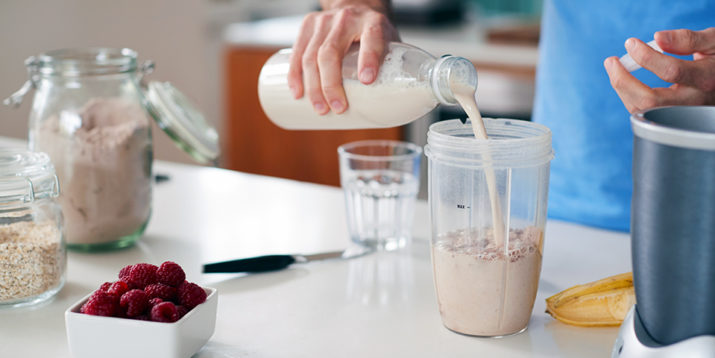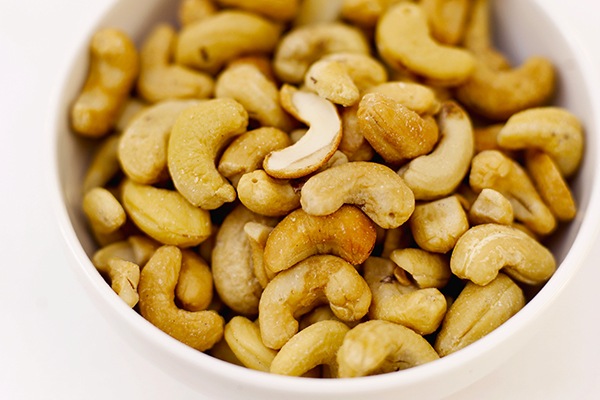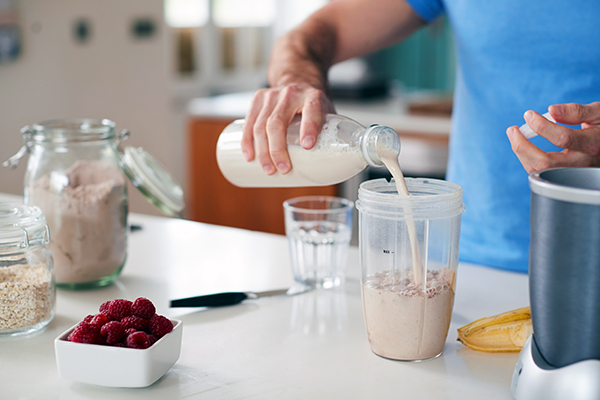Everything You Need to Know About Cashew Milk

Looking for a creamy, plant-based drink? Cashew milk is a lactose-free milk alternative made from cashews and water.
We’ll go over cashew milk nutrition facts and benefits plus explain how it stacks up to popular rivals like almond milk and oat milk.
Cashew Milk Nutrition Facts
How healthy is cashew milk? One thing’s for certain: nut milk nutrition varies widely depending on how it’s made.
According to Brittany Crump, M.P.H., R.D. at Savor Nutrition, “Store-bought cashew milk is grounded cashews that are soaked in water then filtered. The milk has a light, nutty taste that’s not too different from almond milk.”
Since store-bought cashew milk is filtered and diluted with water, it’s lower in calories than its homemade cousin.
Cashews grind easily, so there’s no need to strain the liquid.
Recipes for how to make cashew milk call for a 1:4 ratio of cashew: water and yield about 5 cups of milk.
With this assumption, a cup of homemade cashew milk has 152 calories compared to 25 calories in unsweetened store-bought cashew milk (see table below).

| Homemade Cashew Milk, Unstrained (1 cup) | Unsweetened Cashew Milk (1 cup) | Unsweetened Almond Milk (1 cup) | Unsweetened Oat Milk (1 cup) | |
| Calories | 152 | 25 | 37 | 60 |
| Fat (g) | 12 | 2 | 2 | 3 |
| Protein (g) | 4 | <1 | 1 | 1 |
| Carbohydrates (g) | 8 | 1 | 3 | 7 |
| Calcium (mg) | 11 | 450 | 449 | 460 |
| Magnesium (mg) | 66 | not available | 15 | not available |
| Copper (mg) | 0.6 | not available | 0 | not available |
| Vitamin E (mg) | 0.3 | 4 | 7 | not available |
| Vitamin A (mcg) | 0 | 150 | 220 | 225 |
| Vitamin D (mcg) | 0 | 2.5 | 2.4 | 3.5 |
Is cashew milk or almond milk better for you?
Which nut milk is the healthiest? With store-bought varieties, it’s a tie. Both almond and cashew milk are good options for those allergic to dairy.
Both milk types have similar amounts of fortified nutrients.
Store-bought non-dairy milk is usually fortified with vitamins A and D — the nutrients of which nuts contain very little.
If you’re making nut milk at home, know that almonds are naturally higher in vitamin E and calcium, but cashews contain more vitamin K and zinc.
Straining out the solids and adding water will make your beverage less calorie-dense but may cause some loss of nutrients.
Is cashew milk better than oat milk?
Unless you have a nut allergy, oat milk isn’t much better for you than cashew milk. Both contain similar amounts of fortified nutrients.
Oat milk has more calories and carbs, but at 60 calories a cup, it’s not an unreasonable amount for milk. Unlike oats, oat milk does not contain as much fiber.
Takeaway: Choose the nut (or oat) milk of your fancy! The nutritional differences aren’t compelling enough to make a recommendation.
To get the benefits of all three, layer them as ingredients in a smoothie as we did for this Banana Cashew Latte.

4 Benefits of Cashew Milk
1. Cashew milk is a source of healthy fats
Cashew milk gets its taste from mostly healthy fats, which is better for your heart.
Here’s how: The fat in cashews is primarily monounsaturated fat, which may help maintain healthy cholesterol levels.
While cashews contain saturated fat, it’s mostly in the form of stearic acid, which is believed not to negatively impact blood cholesterol.
2. Cashew milk can provide calcium plus vitamins A, D, and E
Fortified cashew milk is a good source of calcium and vitamin D, nutrients that are important for bone health.
Vitamin A is key for immune function, vision, and much more. Vitamin E is an antioxidant that might protect you from harmful free radicals from the environment and natural human metabolism.
To cash in on these benefits, you’ll need to buy fortified cashew milk. Homemade cashew milk won’t contain much of these nutrients.
3. Cashew milk contains fewer calories
Compared to cow’s milk and even almond milk, storebought cashew milk is low in calories.
At just 25 calories per cup, this seems like a calorie-saving food swap as long as you’re mindful not to overeat elsewhere.
4. Cashew milk can be included in plant-based diets
Followers of a vegan or vegetarian diet can use cashew milk in place of cow’s milk for recipes from soups to sauces and even baked goods.
But please note: Cashew milk is not a direct replacement for cow’s milk in regards to protein.
For those craving ice cream, you can even find cashew milk ice cream and other frozen desserts at the store.
Naturally, cashew milk isn’t your only dairy-free option. Crump says, “It’s all a matter of taste. I recommend going with the milk you enjoy best.”
For more inspiration, read 11 Delicious Dairy-Free Milk Alternatives.
